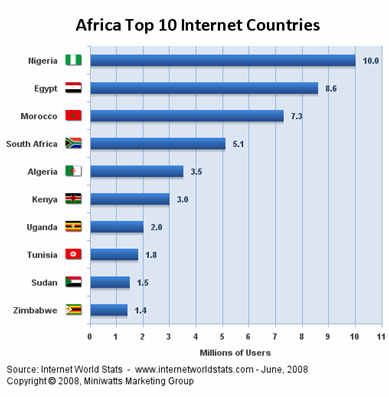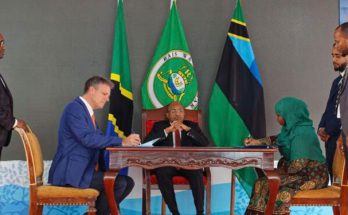 At least 45 of the 54 capital cities in Africa now offer their residents live public Internet access services and of these eight countries have local dial-up access throughout their more rural regions. The rapid adaptation of the Internet as a business tool over the past three years is the main reason for the surge in connections but over-regulation and poor telecommunication infrastructure continue to pose serious obstacles to true cyber-connectivity. None of the 42 Internet connected countries provided access at anywhere near the world norm of one in 45 people with direct Internet access.
At least 45 of the 54 capital cities in Africa now offer their residents live public Internet access services and of these eight countries have local dial-up access throughout their more rural regions. The rapid adaptation of the Internet as a business tool over the past three years is the main reason for the surge in connections but over-regulation and poor telecommunication infrastructure continue to pose serious obstacles to true cyber-connectivity. None of the 42 Internet connected countries provided access at anywhere near the world norm of one in 45 people with direct Internet access.
South Africa is still rated the best in Africa, with one in 65 people having direct access to the Internet but elsewhere in Africa, the average is nearer one in 4,000 people. Zimbabwe ranks third in Africa with one in 1,000 people boasting direct access, while a full 700,000 of the estimated one million people in Africa with public access to the Internet are believed to reside in South Africa. E-mail access, although often too expensive, too slow, and hampered by phone lines inadequate in both number and quality, is spreading rapidly in Africa. There are only a few countries now where there is no known connectivity. Web access is more limited, but is also spreading rapidly.
Within the continent, South Africa is comparable to most European countries in the level of connectivity. In general, Southern Africa is the most advanced region, but countries all over the continent are getting connected. Even the Central African Republic’s telecommunications company went on-line with a full Web connection way back in April 1996. At present the cost of connection is still relatively high, and availability limited. But e-mail communication is already far cheaper than fax and phone. Currently, with the exception of South Africa, the majority of information and messages about African countries and issues on the Internet still comes from host computers in Western countries. Business information concerning Africa available on-line at present comes primarily from international governmental and non-governmental organisations, a few national governments as well as privately hosted websites like The Africa Business Pages which is hosted by Dubai-based Gateway Marketing.
Increasingly, information on the Internet provided in one form is often available in another form as well, just as you can get most printed magazines at a newsstand, at a library, or by subscription. Tools for accessing the Web by e-mail are also available, although the process is less directly interactive and requires more patience and planning. Despite rapid recent progress, Africa continues to lag far behind the developed world where, for example, one in six people in North America and Europe are estimated to use the Internet regularly. Internet and electronic mail (e-mail) are essential in assisting African businesses to overcome their traditional constraints to economic development, such as distance from markets. High Internet access charges are also a serious problem. Other problems include a severe shortage of skilled technology personnel, the high cost of computer and communication equipment, inadequate telecommunications infrastructure and unreasonable regulatory environments in many countries.
directly interactive and requires more patience and planning. Despite rapid recent progress, Africa continues to lag far behind the developed world where, for example, one in six people in North America and Europe are estimated to use the Internet regularly. Internet and electronic mail (e-mail) are essential in assisting African businesses to overcome their traditional constraints to economic development, such as distance from markets. High Internet access charges are also a serious problem. Other problems include a severe shortage of skilled technology personnel, the high cost of computer and communication equipment, inadequate telecommunications infrastructure and unreasonable regulatory environments in many countries.
One of the most serious problems in Africa is teledensity – or the number of telephone lines per 100 people. There are in fact more telephone lines in just New York or Tokyo than in the whole of Africa. This disastrous state of telecommunications is directly related to the State control and monopoly model adopted by African counties and the fact that governments have concentrated their telecommunication drives on urban areas while 89% of Africa’s population live in rural areas. The only solution to the problems is for governments to embrace privatisation. This does not necessarily mean handing entire the telecommunication industries over to multi-national companies – South Africa has proved that local investors are more than willing to invest in potentially lucrative markets either directly or through the stock exchange.
The 15th ITELEXPO-INTERNATIONAL TRADE EXHIBITION ON IT, TELECOM & SATELLITE PRODUCTS
Categories:
- Information Technology
- Telecommunication
- UPS Systems
- Satellite
- Consumer Electronics
- Generators/ Alternative Energy
The 15th ITELEXPO is an opportunity to meet Importers in Africa and exhibitors from worldwide.





Comments are closed.